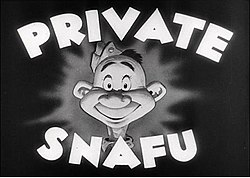

SNAFU is an acronym that is widely used to stand for the sarcastic expression "Situation normal: all fucked up". It is an example of military acronym slang. It is sometimes censored to "all fouled up" or similar. [3] It means that the situation is bad, but that this is a normal state of affairs. The acronym is believed to have originated in the United States Marine Corps during World War II.
Contents
In modern usage, SNAFU is used to describe running into an error or problem that is large and unexpected. For example, in 2005, The New York Times published an article titled "Hospital Staff Cutback Blamed for Test Result Snafu". [4] SNAFU also sometimes refers to a bad situation, mistake, or cause of trouble, and it is sometimes used as an interjection.